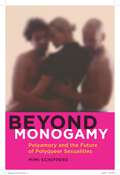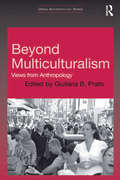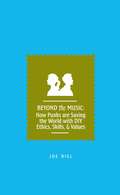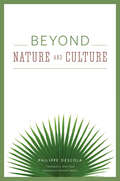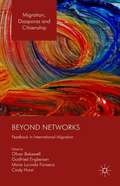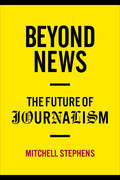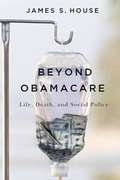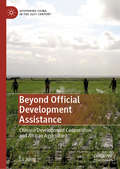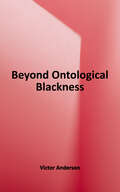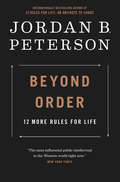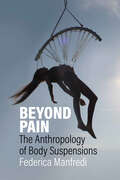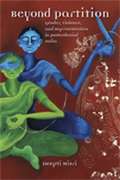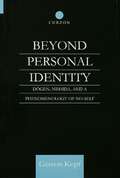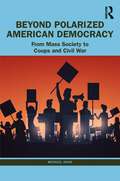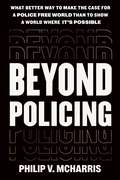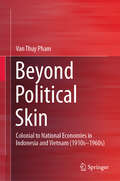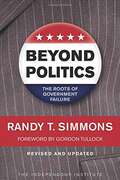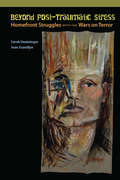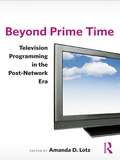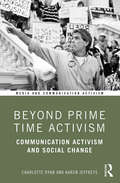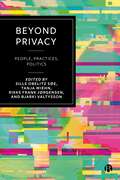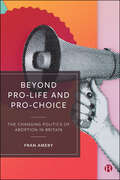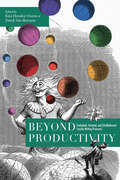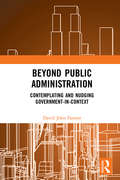- Table View
- List View
Beyond Monogamy: Polyamory and the Future of Polyqueer Sexualities (Intersections #13)
by Mimi SchippersA man and woman are in an open relationship. They have agreed that having sexual partners outside of their relationship is permissible. One night, when her partner is in another city, the woman has sex with the man’s best friend. What does this mean for their relationship? More importantly, why is there such a strong cultural taboo against this kind of triangulation and what does it reveal about the social organization of gender and sexuality? In Beyond Monogamy, Mimi Schippers asks these and other questions to explore compulsory monogamy as a central feature of sexual normalcy. Schippers argues that compulsory monogamy promotes the monogamous couple as the only legitimate, natural, or desirable relationship form in ways that support and legitimize gender, race, and sexual inequalities. Through an investigation of sexual interactions and relationship forms that include more than two people, from polyamory, to threesomes, to the complexity of the ‘down-low,’ Schippers explores the queer, feminist, and anti-racist potential of non-dyadic sex and relationships. A serious look at the intersections of society and sexuality, Beyond Monogamy takes the reader on a compelling and accessible journey through compulsory monogamy, polyamory, and polyqueer sex and relationships.
Beyond Multiculturalism: Views from Anthropology (Urban Anthropology)
by Giuliana B. PratoWhile the anthropological field initially shied away from the debate on multiculturalism, it has been widely discussed within the fields of political theory, social policy, cultural studies and law. Beyond Multiculturalism is the first volume of its kind to offer a comparative, worldwide view of multiculturalism, considering both traditional multicultural/multiethnic societies and those where cultural pluralism is relatively new. Its varied case studies focus on the intersections and relationships between cultural groups in everyday life using employment, identity, consumption, language, legislation and policy making to show the unique contribution anthropologists can bring to multiculturalism studies. Their work will be of great interest to scholars of race, ethnicity, migration, urban studies and social and cultural geography.
Beyond The Music
by Joe BielPunk is notorious for its loud music, aggressive attitude, and safety-pinned style. Less well known is the radical value system that has emerged hand in hand with the sound and aesthetic. Since the 1970s, punks have built their music, fashion, and lifestyles around core values of social justice, creative freedom, community integrity, fiercely democratic politics and do-it-yourself ingenuity. From journalism to psychology, graphic design to alternative fuel, bodybuilding to the Occupy movement, these interviews show just some of the ways that punk values continue to shape mainstream American life.
Beyond Nature and Culture
by Philippe Descola“Gives to anthropological reflection a new starting point and will become the compulsory reference for all our debates in the years to come.” —Claude Lévi-Strauss, on the French editionBeyond Nature and Culture has been a major influence in European intellectual life since its French publication in 2005. Here, finally, it is brought to English-language readers. At its heart is a question central to both anthropology and philosophy: what is the relationship between nature and culture?Culture—as a collective human making, of art, language, and so forth—is often seen as essentially different from nature, which is portrayed as a collective of the nonhuman world, of plants, animals, geology, and natural forces. Philippe Descola shows this essential difference to be not only a Western notion, but also a very recent one. Drawing on ethnographic examples from around the world and theoretical understandings from cognitive science, structural analysis, and phenomenology, he formulates a sophisticated new framework, the “four ontologies” —animism, totemism, naturalism, and analogism—to account for all the ways we relate ourselves to nature. By thinking beyond nature and culture as a simple dichotomy, Descola offers a fundamental reformulation by which anthropologists and philosophers can see the world afresh.“A compelling and original account of where the nature-culture binary has come from, where it might go—and what we might imagine in its place.” —Somatosphere“The most important book coming from French anthropology since Claude Lévi-Strauss’s Anthropologie Structurale.” —Bruno Latour, author of An Inquiry into Modes of Existence“Descola’s challenging new worldview should be of special interest to a wide range of scientific and academic disciplines from anthropology to zoology . . . Highly recommended.” —Choice
Beyond Networks: Feedback In International Migration (Migration, Diasporas and Citizenship)
by Oliver Bakewell Godfried Engbersen Cindy Horst Maria FonsecaThis edited volume explores migration movements to Norway, the Netherlands, the United Kingdom and Portugal from Brazil, Morocco and Ukraine, focusing on how the migration processes of yesterday influence those of today. The central analytical tool for this undertaking is the concept of feedback. This volume identifies various feedback mechanisms that initiate, perpetuate and reverse migration movements. It pays attention to the role of personal networks, but it also moves beyond networks by analysing the role of institutions, macro-level factors and forms of broadcast feedback operating through impersonal channels. Based on extensive surveys and in-depth interviews, it changes our understanding of how and why patterns of international migration change over time.
Beyond News: The Future of Journalism (Columbia Journalism Review Books)
by Mitchell StephensFor a century and a half, journalists made a good business out of selling the latest news or selling ads next to that news. Now that news pours out of the Internet and our mobile devices—fast, abundant, and mostly free—that era is ending. Our best journalists, Mitchell Stephens argues, instead must offer original, challenging perspectives—not just slightly more thorough accounts of widely reported events. His book proposes a new standard: "wisdom journalism," an amalgam of the more rarified forms of reporting—exclusive, enterprising, investigative—and informed, insightful, interpretive, explanatory, even opinionated takes on current events.This book features an original, sometimes critical examination of contemporary journalism, both on- and offline, and it finds inspiration for a more ambitious and effective understanding of journalism in examples from twenty-first-century articles and blogs, as well as in a selection of outstanding twentieth-century journalism and Benjamin Franklin's eighteenth-century writings. Most attempts to deal with journalism's current crisis emphasize technology. Stephens emphasizes mindsets and the need to rethink what journalism has been and might become.
Beyond Obamacare: Life, Death, and Social Policy
by James S. HouseHealth care spending in the United States today is approaching 20 percent of GDP, yet levels of U.S. population health have been declining for decades relative to other wealthy and even some developing nations. How is it possible that the United States, which spends more than any other nation on health care and insurance, now has a population markedly less healthy than those of many other nations? Sociologist and public health expert James S. House analyzes this paradoxical crisis, offering surprising new explanations for how and why the United States has fallen into this trap. In Beyond Obamacare, House shows that health care reforms, including the Affordable Care Act, cannot resolve this crisis because they do not focus on the underlying causes for the nation’s poor health outcomes, which are largely social, economic, environmental, psychological, and behavioral. House demonstrates that the problems of our broken health care and insurance system are interconnected with our large and growing social disparities in education, income, and other conditions of life and work, and calls for a complete reorientation of how we think about health. He concludes that we need to move away from our misguided and almost exclusive focus on biomedical determinants of health, and to place more emphasis on addressing social, economic, and other inequalities. House’s review of the evidence suggests that the landmark Affordable Care Act of 2010, and even universal access to health care, are likely to yield only marginal improvements in population health or in reducing health care expenditures. In order to rein in spending and improve population health, we need to refocus health policy from the supply side—which makes more and presumably better health care available to more citizens—to the demand side—which would improve population health though means other than health care and insurance, thereby reducing need and spending for health care. House shows how policies that provide expanded educational opportunities, more and better jobs and income, reduced racial-ethnic discrimination and segregation, and improved neighborhood quality enhance population health and quality of life as well as help curb health spending. He recommends redirecting funds from inefficient supply-side health care measures toward broader social initiatives focused on education, income support, civil rights, housing and neighborhoods, and other reforms, which can be paid for from savings in expenditures for health care and insurance. A provocative reconceptualization of health in America, Beyond Obamacare looks past partisan debates to show how cost-efficient and effective health policies begin with more comprehensive social policy reforms.
Beyond Official Development Assistance: Chinese Development Cooperation and African Agriculture (Governing China in the 21st Century)
by Lu JiangThis book investigates China’s contemporary development cooperation mentality and modality through the case of its agricultural engagement with Africa. It identifies three models, namely traditional agro-aid, innovative agro-aid and agribusiness models, of Chinese current agro-development cooperation with Africa, and unpacks the different models by tracing their historical origins and examining the actual practice based on project-level fieldwork conducted in Mozambique and South Africa. The book provides a preliminary and qualitative evaluation of China’s current agro-development cooperation with Africa, and explains the ‘implementation gaps’ as observed on the ground adopting a public policy approach. It also compares the Chinese way of development cooperation with that of the traditional donors (particularly the OECD-DAC members), and calls for a broadening understanding for international development cooperation that can allow win-win ideology and embrace diversified cooperation forms beyond the official development assistance (ODA).
Beyond Ontological Blackness: An Essay on African American Religious and Cultural Criticism (The Transatlantic Slave Trade: Bloomsbury Academic Collections)
by Victor AndersonIn this study, the author traces instances of "ontological blackness" in African American theological, religious, and cultural thought, arguing that African American critical thought has been trapped in racial rhetoric that it did not create and which cannot serve it well. <p><p>Drawing together 18th- and 19th-century accommodationism and its assimilationist heirs with the movements of Black Power and Afrocentrism, the author shows that all exhibit a similar structure of racial identity. He suggests that it is time to move beyond the confines of "the cult of black heroic genius" to what Bell Hooks has termed "postmodern blackness:" a racial discourse that leaves room to negotiate African American identities along lines of class, gender, sexuality, and age as well as race.
Beyond Order: 12 More Rules for Life
by Jordan B. PetersonThe highly anticipated sequel to the global bestseller 12 Rules for Life.In 12 Rules for Life, acclaimed public thinker and clinical psychologist Jordan B. Peterson offered an antidote to the chaos in our lives: eternal truths applied to modern anxieties. His insights have helped millions of readers and resonated powerfully around the world. Now in his long-awaited sequel, Peterson goes further, showing that part of life's meaning comes from reaching out into the domain beyond what we know, and adapting to an ever-transforming world. While an excess of chaos threatens us with uncertainty, an excess of order leads to a lack of curiosity and creative vitality. Beyond Order therefore calls on us to balance the two fundamental principles of reality--order and chaos--and reveals the profound meaning that can be found on the path that divides them.In times of instability and suffering, Peterson reminds us that there are sources of strength on which we can all draw: insights borrowed from psychology, philosophy, and humanity's greatest myths and stories. Drawing on the hard-won truths of ancient wisdom, as well as deeply personal lessons from his own life and clinical practice, Peterson offers twelve new principles to guide readers towards a more courageous, truthful, and meaningful life.
Beyond Pain: The Anthropology of Body Suspensions
by Federica ManfrediThe practice of body suspension — piercing one’s own flesh with metal hooks and hanging from them — and its uniquely sprawling community challenge our cultural understanding of pain. The suspendees experience physical suffering to trigger altered states of consciousness that help them define and create an enhanced version of the self. Through experimental and practice-based methodology, Beyond Pain combines thirteen years of intermittent ethnographical fieldwork during suspension festivals and private events in Italy, Portugal, and Norway, along with online sites such as Facebook groups, to uncover the often silenced and misunderstood voices of the people who undertake this practice.
Beyond Partition: Gender, Violence and Representation in Postcolonial India
by Deepti MisriIn Beyond Partition, Deepti Misri shows how 1947 marked the beginning of a history of politicized animosity associated with the differing ideas of "India" held by communities and in regions on one hand, and by the political-military Indian state on the other. Assembling literary, historiographic, performative, and visual representations of gendered violence against men and women, she establishes that cultural expressions do not just follow violence but determine its very contours, and interrogates the gendered scripts underwriting the violence originating in the contested visions of what "India" means. Ambitious and ranging across disciplines, Beyond Partition offers both an overview of and nuanced new perspectives on the ways caste, identity, and class complicate representations of violence, and how such representations shape our understandings of both violence and of India.
Beyond Personal Identity: Dogen, Nishida, and a Phenomenology of No-Self (Routledge Studies in Asian Religion)
by Gereon KopfApplies Dogen Kigen's religious philosophy and the philosophy of Nishida Kitaro to the philosophical problem of personal identity, probing the applicability of the concept of non-self to the philosophical problems of selfhood, otherness, and temporality which culminate in the conundrum of personal identity.
Beyond Personhood: An Essay in Trans Philosophy
by Talia Mae BettcherA bold intervention in the philosophical concepts of gender, sex, and selfBeyond Personhood provides an entirely new philosophical approach to trans experience, trans oppression, gender dysphoria, and the relationship between gender and identity. Until now, trans experience has overwhelmingly been understood in terms of two reductive frameworks: trans people are either &“trapped in the wrong body&” or they are oppressed by the gender binary. Both accounts misgender large trans constituencies while distorting their experience, and neither can explain the presentation of trans people as make-believers and deceivers or the serious consequences thereof. In Beyond Personhood, Talia Mae Bettcher demonstrates how taking this phenomenon seriously affords a new perspective on trans oppression and trans dysphoria—one involving liminal states of &“make-believe&” that bear positive possibilities for self-recognition and resistance. Undergirding this account is Bettcher&’s groundbreaking theory of interpersonal spatiality—a theory of intimacy and distance that requires rejection of the philosophical concepts of person, self, and subject. She argues that only interpersonal spatiality theory can successfully explain trans oppression and gender dysphoria, thus creating new possibilities for thinking about connection and relatedness. An essential contribution to the burgeoning field of trans philosophy, Beyond Personhood offers an intersectional trans feminism that illuminates transphobic, sexist, heterosexist, and racist oppressions, situating trans oppression and resistance within a much larger decolonial struggle. By refusing to separate theory from its application, Bettcher shows how a philosophy of depth can emerge from the everyday experiences of trans people, pointing the way to a reinvigoration of philosophy.
Beyond Polarized American Democracy: From Mass Society to Coups and Civil War
by Michael HaasCivil war in the United States is now a mainstream topic due to apparent signs of ongoing planning. This book reveals why in several ways. First, four major ideological drivers of possible conflict are identified. Next, ten arenas of ongoing nonviolent civil war are traced as increasingly for micro-level violence. Then several dozen alternative scenarios are traced to explain how civil war could break out very soon. Finally, measures are delineated about how the country might prevent calamity. Anarchists, Christian Nationalists, Libertarians, and Triumphalists are determined to impose their views on the diverse nation and reduce opponents to second-class status. They demonstrate their blatant determination through nonviolent political contests involving conspiracy theories, cultural differences, verbal contestation, anti-elitism, racism, well-armed groups with nationwide membership, political demonization, media disinformation, Congressional hyperpartisanship, reducing constitutional rights, and legal fights by some states against others. But often they go beyond and commit violence out of sheer enjoyment in making opponents suffer. Beyond Polarized American Democracy: From Mass Society to Coups and Civil War suggests remedies for each of ten types of nonviolent civil war, but most are long-term solutions that cannot deal with an imminent threat. Accordingly, the book reviews governmental and military resources as well as efforts to counteract the ideological contest through political innovations. The analysis flows from the sociological Mass Society Paradigm, which argues that democracy’s survival depends upon the ability of civil society to relay the needs of the people to institutions of government and provide effective pressure for corrective action. As developed to explain the rise of Nazism in Germany, the analysis applies lessons from studies of coups and civil wars to identify how to prevent the loss of democracy in the United States.
Beyond Policing
by Philip V. McHarrisWhat would happen if policing disappeared? Would we be safe? This book imagines a world without police. It&’s evident that policing is a problem. But what is the best way forward? In Beyond Policing, distinguished scholar and writer Philip V. McHarris reimagines the world without police to find answers and reveal how we can make police departments obsolete. Beyond Policing tackles thorny issues with evidence, including data and personal stories, to uncover the weight of policing on people and communities and the patterns that prove police reform only leads to more policing. McHarris challenges us to envision a future where safety is not synonymous with policing but is built on the foundation of community support and preventive measures. He explores innovative community-based safety models (like community mediators and violence interrupters), the decriminalization of driving offenses, and the creation of nonpolice crisis response teams. McHarris also outlines strategies for responding to conflict and harm in ways that transform the conditions that give rise to the issues. He asks us to imagine a world where people thrive without the shadow of inequality, where our approach to safety is a collective achievement. McHarris writes, &“What if our response to crisis wasn&’t about control but about care? How can we create conditions where safety is a shared responsibility? How can we design justice so that no community is routinely oppressed? Envisioning such a world isn&’t just a daydream; it&’s the first step toward building a society where violence and fear no longer dictate our lives.&” Transformative and forward thinking, Beyond Policing provides a blueprint for a brighter, safer world. McHarris&’s vision is clear: we must dare to move beyond policing and foster a society where everyone has the resources to thrive and feel safe.
Beyond Political Skin: Colonial to National Economies in Indonesia and Vietnam (1910s-1960s)
by Phạm Văn ThuỷThis book explains the dynamics behind the economic transformation from the colonial era to the post-independence period in Indonesia and Vietnam. It analyses the different Vietnamese and Indonesian government approaches to the economic legacies of colonialism remaining in these countries after independence. It also demonstrates that despite critical differences between the two nation-states, the Vietnamese and Indonesian leaderships were pursuing similar long-term goals: to create a truly independent national economy. The book discusses the way in which the Indonesian government established complete economic control, resembling the socialist transformation of North Vietnam in the 1950s, and the various means by which the government of South Vietnam concentrated economic power in its own hands during the late 1950s and early 1960s. It also explores how the Indonesian government was determined remove the economic legacy of Dutch colonialism by placing the entire economy under strong state control and ownership in accordance with the spirit of Guided Democracy and Guided Economy in the late 1950s and the early 1960s. This book is a point of reference for students, researchers and academics interested in a comparative analysis of the economic systems implemented by the colonial and fascist powers in Indonesia and Vietnam.
Beyond Politics: The Roots Of Government Failure
by Randy T. Simmons Gordon TullockProviding students of economics, politics, and policy with a concise explanation of public choice, markets, property, and political and economic processes, this record identifies what kinds of actions are beyond the ability of government. Combining public choice with studies of the value of property rights, markets, and institutions, this account produces a much different picture of modern political economy than the one accepted by mainstream political scientists and welfare economists. It demonstrates that when citizens request that their governments do more than it is possible, net benefits are reduced, costs are increased, and wealth and freedom are diminished. Solutions are also suggested with the goal to improve the lot of those who should be the ultimate sovereigns in a democracy: the citizens.
Beyond Post-Traumatic Stress: Homefront Struggles with the Wars on Terror
by Sarah Hautzinger Jean ScandlynWhen soldiers at Fort Carson were charged with a series of 14 murders, PTSD and other "invisible wounds of war" were thrown into the national spotlight. With these events as their starting point, Jean Scandlyn and Sarah Hautzinger argue for a new approach to combat stress and trauma, seeing them not just as individual medical pathologies but as fundamentally collective cultural phenomena. Their deep ethnographic research, including unusual access to affected soldiers at Fort Carson, also engaged an extended labyrinth of friends, family, communities, military culture, social services, bureaucracies, the media, and many other layers of society. Through this profound and moving book, they insist that invisible combat injuries are a social challenge demanding collective reconciliation with the post-9/11 wars.
Beyond Prime Time: Television Programming in the Post-Network Era
by Amanda LotzDaytime soap operas. Evening news. Late-night talk shows. Television has long been defined by its daily schedule, and the viewing habits that develop around it. Technologies like DVRs, iPods, and online video have freed audiences from rigid time constraints—we no longer have to wait for a program to be "on" to watch it—but scheduling still plays a major role in the production of television. Prime-time series programming between 8:00 and 11:00 p.m. has dominated most critical discussion about television since its beginnings, but Beyond Prime Time brings together leading television scholars to explore how shifts in television’s industrial practices and new media convergence have affected the other 80% of the viewing day. The contributors explore a broad range of non-prime-time forms including talk shows, soap operas, news, syndication, and children’s programs, non-series forms such as sports and made-for-television movies, as well as entities such as local affiliate stations and public television. Importantly, all of these forms rely on norms of production, financing, and viewer habits that distinguish them from the practices common among prime-time series and often from each other. Each of the chapters examines how the production practices and textual strategies of a particular programming form have shifted in response to sweeping industry changes, together telling the story of a medium in transition at the beginning of the twenty-first century. Contributors: Sarah Banet-Weiser, Victoria E. Johnson, Jeffrey P. Jones, Derek Kompare, Elana Levine, Amanda D. Lotz, Jonathan Nichols-Pethick, Laurie Ouellette, Erin Copple Smith
Beyond Prime Time Activism: Communication Activism and Social Change (Media and Communication Activism)
by Charlotte Ryan Karen JeffreysIn this accessible introduction to communication activism, organizer Karen Jeffreys and sociologist Charlotte Ryan draw on more than two decades of ongoing collaboration, using the Rhode Island Coalition for the Homeless (RICH) as a case study. The book examines a community with shared values, decision-making, and conflict resolution procedures, tracking its organizing strategy and matched communication plan. The authors first describe a communication campaign during the welfare reform battles (1990–1995) in which they began to practice communication activism. In ongoing work with two organizations over the next two decades, they distil a model of communication activism that draws directly from vibrant traditions of empowerment communication in U.S. social movements and movements from the Global South. Beyond Prime Time Activism provides students and researchers with an invaluable look at contemporary activism practices and with practical tools tried and tested in two decades of social movement engagement. This book is ideal for anyone participating in social change movements or studying how they navigate communication and media inequalities.
Beyond Privacy: People, Practices, Politics
by Sille Obelitz Søe, Tanja Wiehn, Rikke Frank Jørgensen, and Bjarki ValtyssonDiscussions around digital technologies, new media, platforms and information have long centred on the protection of personal data and privacy. This timely volume extends the conversation to address fundamental societal and structural issues from three perspectives: people, practices and politics. Organised around an international collection of case studies, the book provides a valuable contribution to our understanding of the challenges of privacy in the digital sphere, from emerging regulatory programmes to surveillance capitalism and big tech companies. Taking a multidisciplinary approach, this is a new and innovative perspective on our datafied societies that goes beyond privacy. It will be a key resource for scholars and students of communication and media studies, and science and technology studies.
Beyond Pro-life and Pro-choice: The Changing Politics of Abortion in Britain
by Fran AmeryExamining the changing pluralities of contemporary abortion debate in the UK, this interdisciplinary book proves it necessary to move beyond an understanding of abortion politics as characterised in binary terms by ‘pro-choice’ versus ‘pro-life’. Amery traces the evolution of political and parliamentary discourses from the passage of the Abortion Act in the 1960s to the present day, arguing that the current provision of abortion in the UK rests assumptions about medical authority over women’s reproductive decision-making which are unsustainable. She considers new arguments around sex-selective abortion, disability rights, pre-abortion counselling and the push for decriminalisation and radically reconceptualises the debate to account for these new battlegrounds in abortion politics.
Beyond Productivity: Embodied, Situated, and (Un)Balanced Faculty Writing Processes
by Kim Hensley Owens Derek Van IttersumIn Beyond Productivity, a wide range of contributors share honest narratives of the sometimes-impossible conditions that scholars face when completing writing projects. The essays provide backstage views of the authors' varying approaches to moving forward when the desire to produce wanes, when deciding a project is not working, when working within and around and redefining academic productivity expectations, and when writing with ever-changing bodies that do not always function as expected. This collection positions scholarly writers' ways of writing as a form of flexible, evolving knowledge. By exhibiting what is lost and gained through successive rounds of transformation and adaptation over time, the contributors offer a sustainable understanding and practice of process—one that looks beyond productivity as the primary measure of success. Each presents a fluid understanding of the writing process, illustrating its deeply personal nature and revealing how fragmented and disjointed methods and experiences can highlight what is precious about writing. Beyond Productivity determines anew the use and value of scholarly writing and the processes that produce it, both within and beyond the context of the losses, constraints, and adaptations associated with the COVID-19 pandemic.
Beyond Public Administration: Contemplating and Nudging Government-in-Context (Routledge Research In Public Administration And Public Policy Ser.)
by David FarmerHow can public administration (P.A.) nudge government to govern fundamentally better in terms of policy? How critical is P.A. contemplation and nudges – prods, shoves or hammer blows - to government-in-context? In this book, David John Farmer argues that government-in-context refers to government-in-totality, to what governs even if not called government and to what constrains government action. Constricting contextual features are infiltration, exfiltration and post-truth, raising questions relating to democracy. Infiltration into government is the action of gaining access that benefits big corporations, their owners and billionaires; findings are that it also mal-nudges government action through such elements as big money, lobbying, tax breaks and embrace of the free market. Reacting to factors like growing income inequality, what is explained as exfiltration occurs for middle- and lower-income people. Post-truth is noted as the Oxford Dictionary’s word of the year for 2016, describing people concerned less with truths than with opinions. The book analyzes three practical "hammer blow" and 18 "shove" nudges to contradict the mal-nudges. Beyond Public Administration will be of interest to P.A. scholars and graduate students, more specifically those interested in critical, normative, or interpretive scholarship focused on various aspects of P.A. theory, governance, and practical management.
